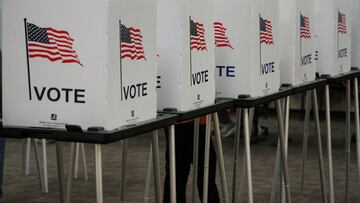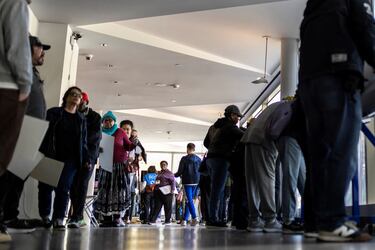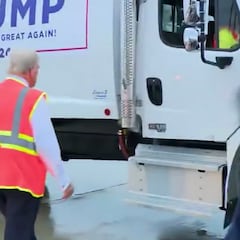Can you get in trouble if you give water to voters in line? Is ‘line warming’ legal?
There are states in the US that ban the distribution of food and drink to Americans waiting in line to vote.


Electioneering, defined by Cambridge University Press as “the activity of trying to persuade people to vote for a particular political party”, is banned in or near polling places throughout the US during elections. Within a radius that varies from state to state - but is most commonly 150 feet from a polling station - no canvassing will be allowed as voters turn out to cast their ballot in this year’s US presidential contest. In many parts of the country, indeed, anti-electioneering laws mean Americans should think twice about what they wear when they go to vote: in 21 states, per the National Conference of State Legislatures (NCSL), you cannot sport any attire that could be deemed an attempt to influence others’ voting intentions.
In some areas of the US, anti-electioneering rules are even stricter. At polling places where there are lengthy lines - four years ago, there were reported instances of voters having to queue up for as long as 11 hours - it might seem only logical that efforts should be made to keep the electorate fed and watered as they wait. In some states, however, the act of handing out food or drink to voters standing in line is considered electioneering - not only when carried out by an individual or body connected to a political candidate, but also if it’s done by a representative of a non-partisan organization.
Where in the US is ‘line warming’ banned?
Known as ‘line warming’, it is banned with 100 feet of polling stations in Arkansas, for instance. Enacted by the Republican-led state legislature in 2021, this law was blocked by a state judge in 2022, only to be reinstated by the Arkansas Supreme Court earlier this year. Georgia is another state where line warming is prohibited: this legislation, which is also a GOP-driven initiative, was narrowed by a federal judge in August 2023, but nevertheless makes it illegal to hand voters water or snacks anywhere within 150 feet of a polling location. Check out the NCSL’s full list of US states where line warming is prohibited.

“Voters disenfranchised through long lines”
Elsewhere in the US, though, there has been recent action to reverse the banning of line warming. In May this year in New York, for example, a century-old law prohibiting the distribution of refreshments in voter lines was struck down by a federal court.
Related stories
And, frequently, such attempts to make Americans’ polling-station wait a more manageable experience are most keenly felt by specific sections of society. As the American Bar Association notes: “Poor and minority voters have historically faced longer wait times to cast their ballot than affluent White voters.”
By making line warming a punishable offence, states are putting these demographic groups in particular at risk of exclusion from the electoral process, experts warn. “We have state legislatures passing bill after bill that is making voting harder and more burdensome legislative session after legislative session, and we keep hearing about ‘voter fraud,’” Caren Short, director of legal and research for the League of Women Voters, told an interview with the Huffington Post this month. “What we’re not seeing is voter fraud. What we are seeing is voter suppression and state legislatures using the myth of voter fraud to justify laws that are causing scores and scores of voters to be disenfranchised through long lines.”


Complete your personal details to comment